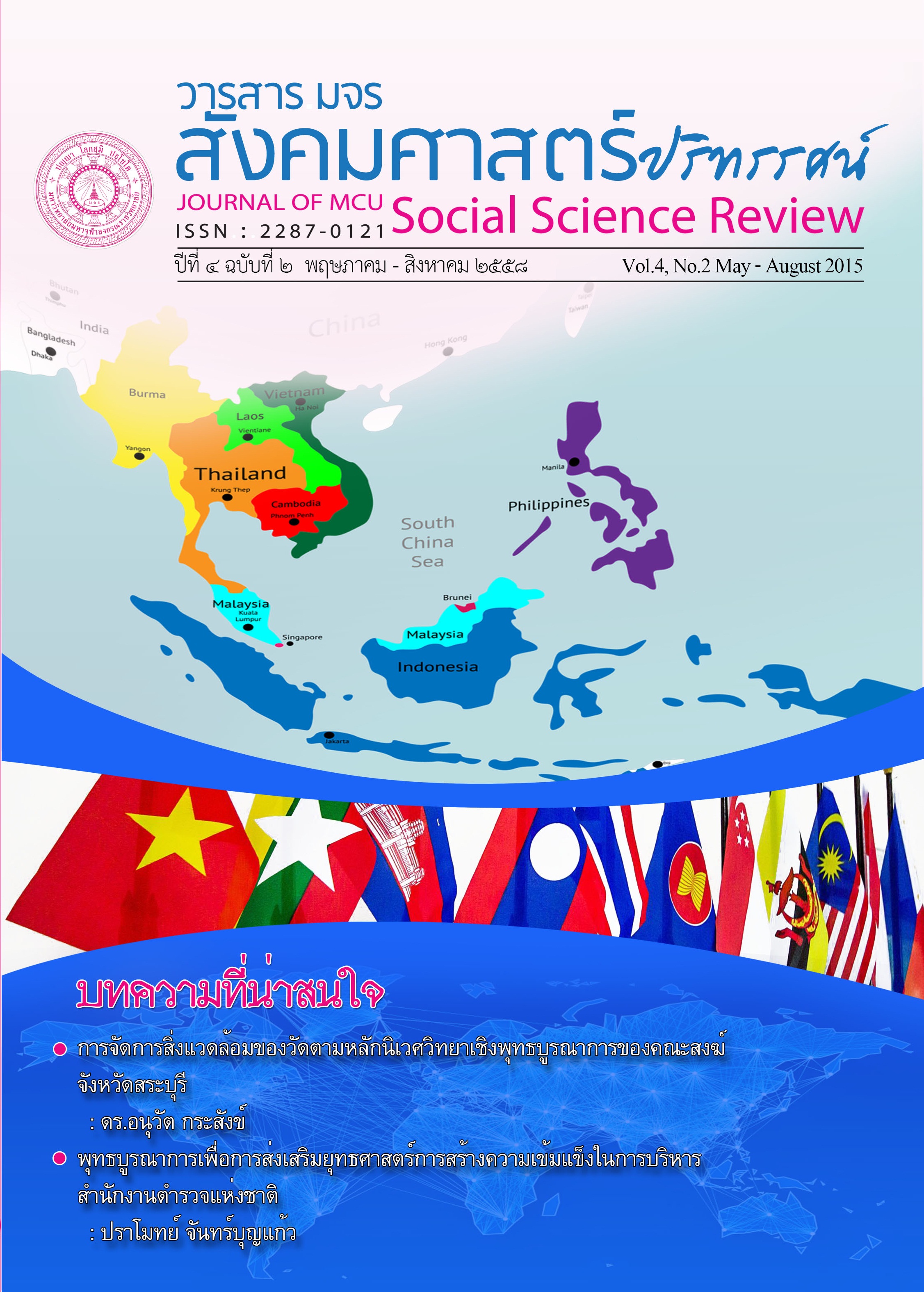การปกครองที่เป็นธรรมในพระพุทธศาสนาเถรวาท
คำสำคัญ:
การปกครอง, การปกครองที่เป็นธรรม, พระพุทธศาสนาเถรวาทบทคัดย่อ
การปกครองที่เป็นธรรม และมีระเบียบในการปกครองที่ทําให้เกิติความสงบเรียบร้อย ที่พระพุทธเจ้าได้ตรัสไว้ในเรื่องอธิปไตยทั้ง ๓ ประการ คือ (๑) ฮัตตาธิปไตย (๒) โลกาธิปไตย (n) กรรมาธิปไตย ซึ่งผู้ปกครองซะต้องเป็นผู้ทรงธรรม มีความยุติธรรม มีความรอบรู้ ตามหลัก กฎหมาย และหลักศีลธรรม หมายถึง หลักธรรมที่พระราชาและผู้นํา ใช้การปกครอง ได้แก่ หลัก ทศพิธราชธรรม ติณ, ซักรวรรดิวัตร ๓๒, ราชสังคหวัตถุ ๔, และอศิต ๔, ใช้สําหรับชนชั้นผู้นํา และหลักธรรมที่ประพฤติร่วมกัน ทั้งชนชั้นผู้ปกครอง ข้าราชบริพาร และประชาราษฎร ได้แก่ พริต 5 และ ทิศ 5 ดังนั้น รูปแบบการปกครองในพุทธปรัชญาเถรวาทนั้น แบ่งเป็น 2 รูปแบบ คือ (a) รูปแบบการปกครองแบบราชาธิปไตย กล่าวคือ การปกศรองที่มีพระราชาเป็นใหญ่เป็นการ ปกครองโดยบุคคลคนเดียว ชัตเป็นรูปแบบการปกครองที่มีประสิทธิภาพมากที่สุด เพราะเป็นทั้งผู้ ฮอกกฎหมาย และเป็นผู้ใช้กฎหมายซึ่งมีความเสี่ยงตัว และทรงไว้ซึ่งอํานาจสูงสุด (2) รูปแบบ การปกครองแบบสามัคคีธรรม กล่าวคือ การปกครองที่พร้อมเพรียงอย่างขอบธรรม เป็นการ ปกศรสูงโดยการรวมหลายรัฐแล้ว เลือกผู้นําขึ้นมาคณะหนึ่ง เพื่อทําหน้าที่บริหารประเทศ มีการ สับเปลี่ยนกันตามแต่ประชาชนจะเลือกเข้ามา หรือเรียกว่า ประชาชื่ปไตย โดยมีหลักการปกครอง 8 ประเด็น คือ (๑) มีสิทธิที่จะกระทําการใดๆ ที่ไม่ขัดต่อสิทธิของผู้อื่นหรือขัดต่อศีลธรรม มีเสรีภาพที่ จะกระทําการใดๆ ได้ตามที่ตนปรารถนาโดยไม่มีอุปสรรคขัดขวาง (๒) มีความเสมอภาคตามกฏของ ไตรลักษณ์ และทางสังคม เช่น ชนชั้น เพศ (๓) มีความสมัครสมานสามัคคีในหมู่คณะ ที่เรียกว่า ภราดรภาพ
เอกสารอ้างอิง
(๑) หนังสือ
จํานงศ์ ทองประเสริฐ, พระมหาธรรมิกราชาธิราช. กรุงเทพมหานคร : โรงพิมพ์สหธรรมิก จํากัด,๒๕๔๙.
นิติภูมิ นวรัตน์, ร.ต.อ. ตร. คุณลักษณะและกระบวนการปลูกฝังคุณธรรมจริยธรรมของประเทศเวียดนาม. กรุงเทพมหานคร : ศูนย์ส่งเสริมและพัฒนาพลังแผ่นดินเชิงทุณธรรม,๒๕๔๐.
ปรีชา ข้างขวัญยืน. ทรรศนะทางการเมืองของพระพุทธศาสนา กรุงเทพมหานคร : สามัคคีเสาส์น,๒๕๔๐.
พุทธทาสภิกขุ, ธรรมบรรยายชุดทศพิธราชธรรม. กรุงเทพมหานคร : โรงพิมพ์สหมิตร, ๒๕๓๑.
“พระเมธีธรรมานภรณ์ (ประยูร ธมฺมจิตฺโต), พุทธศาสนากับปรัชญา (กรุงเทพมหานคร : บริษัท อมรินทร์พริ้นติ้งกรุ๊ฟ จํากัด, ๒๕๓๓), หน้า และ
พระธรรมปิฎก (ป.อ. ปยุตโต), พจนานุกรมพุทธศาสตร์ฉบับประมวลธรรม. กรุงเทพมหานคร : โรงพิมพ์มหาจุฬาลงกรณราชวิทยาลัย, ๒๕๔๓
- พุทธศาสนาจะวิกฤติ ต้องศิตให้ไกล รู้ให้ทัน. กรุงเทพมหานคร: สํานักพิมพ์มูลนิธิพุทธรรม, ๒๕๔๔.
- วัฒนธรรมไทยสู่ยุคเป็นผู้นําและเป็นผู้ให้, กรุงเทพมหานศระ บริษัท สหธรรมิก จำกัด, ๒๕๓๗.
พระธรรมกิตติวงศ์ (ทองดี สุรเตโช), ศวัต ๒. กรุงเทพมหานคร : สํานักพิมพ์เลี่ยงเซียง, ๒๕๔๕ พระเทพเวที (ประยุทธ์ ปยุตโต), พจนานุกรมพุทธศาสตร์ ฉบับประมวลธรรม. พิมพ์ครั้งที่ ๓.กรุงเทพมหานคร : โรงพิมพ์มหาจุฬาลงกรณราชวิทยาลัย, ๒๕๓๕
พระเมธีธรรมาภรณ์ (ประยูร ธมมจิตโต), พุทธศาสนากับปรัชญา. กรุงเทพมหานคระ บริษัท
อมรินทร์พริ้นติ้งกรุ๊ฟ ๒๕๓๓.
สุนทร ณ รังษี, สถาบันทางการเมืองตามแนวพุทธศาสตร์ รัฐศาสตร์ตามแนวพุทธศาสตร์ กรุงเทพมหานคร : สํานักงานคณะกรรมการวัฒนธรรมแห่งชาติ, b๕ma สุทธิวงศ์ สันตยาพิศาลสุทธิ์. หลักธรรมทางพระพุทธศาสนาจากพระไตรปิฎr. กรุงเทพมหานคร :สํานักพิมพ์ธรรมสภา, ๕๕
สมบูรณ์ สุขสําราญ พุทธศาสนากับการเปลี่ยนแปลงทางการเมืองและสังคม. กรุงเทพมหานคร -สํานักพิมพ์จุฬาสงกรณ์มหาวิทยาลัย, ๒๕๒๗. สวัสดิ์ พินิจจันทร์, ศศิธรรม. กองวัฒนธรรม กรมการศาสนา กระทรวงศึกษาธิการ
กรุงเทพมหานคร : โรงพิมพ์การศาสนา, ๒๕๐๕.
(๒) วารสาร
สมภาร พรมทา. สิทธิในทัศนะของพุทธศาสนา, พุทธศาสตร์ศึกษา. ปีที่ 8 ฉบับที่ มกราคม - เมษายน, ๒๕๓๗.
E. ภาษาอังกฤษ
(1) Book
Phraphomkhunaphon (P. A Payutto). A Constitution for Living Buddhist Principlesfor a Fruitful and Harmonious Life. Bangkok Office of National Buddhism Press, 1997.
ดาวน์โหลด
เผยแพร่แล้ว
รูปแบบการอ้างอิง
ฉบับ
ประเภทบทความ
สัญญาอนุญาต
ลิขสิทธิ์ (c) 2018 วารสาร มจร สังคมศาสตร์ปริทรรศน์

อนุญาตภายใต้เงื่อนไข Creative Commons Attribution-NonCommercial-NoDerivatives 4.0 International License.
เพื่อให้เป็นไปตามกฎหมายลิขสิทธิ์ ผู้นิพนธ์ทุกท่านต้องลงลายมือชื่อในแบบฟอร์มใบมอบลิขสิทธิ์บทความให้แก่วารสารฯ พร้อมกับบทความต้นฉบับที่ได้แก้ไขครั้งสุดท้าย นอกจากนี้ ผู้นิพนธ์ทุกท่านต้องยืนยันว่าบทความต้นฉบับที่ส่งมาตีพิมพ์นั้น ได้ส่งมาตีพิมพ์เฉพาะในวารสาร มจร สังคมศาสตร์ปริทรรศน์ เพียงแห่งเดียวเท่านั้น หากมีการใช้ภาพหรือตารางหรือเนื้อหาอื่นๆ ของผู้นิพนธ์อื่นที่ปรากฏในสิ่งตีพิมพ์อื่นมาแล้ว ผู้นิพนธ์ต้องขออนุญาตเจ้าของลิขสิทธิ์ก่อน พร้อมทั้งแสดงหนังสือที่ได้รับการยินยอมต่อบรรณาธิการ ก่อนที่บทความจะได้รับการตีพิมพ์ หากไม่เป็นไปตามข้อกำหนดเบื้องต้น ทางวารสารจะถอดบทความของท่านออกโดยไม่มีข้อยกเว้นใดๆ ทั้งสิ้น





